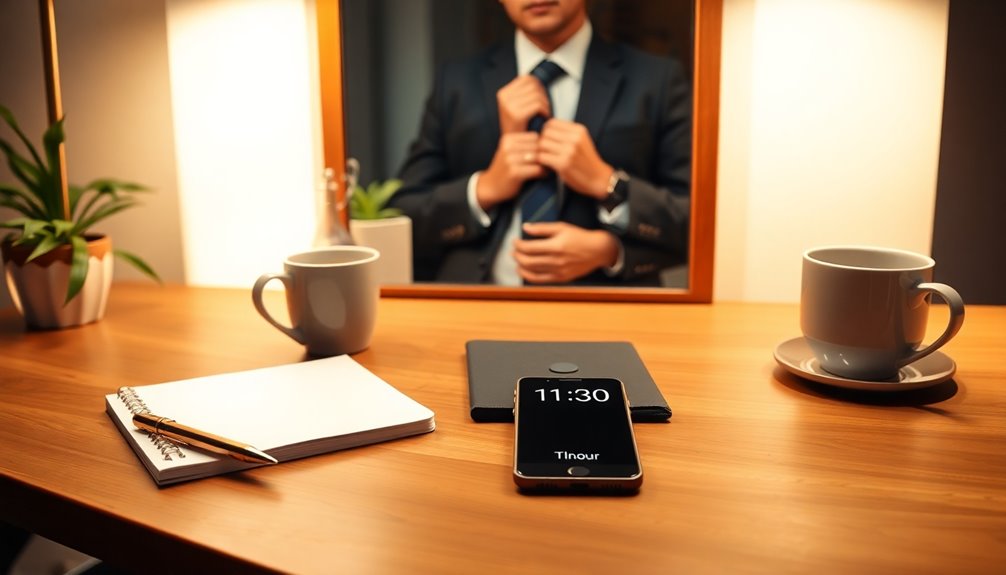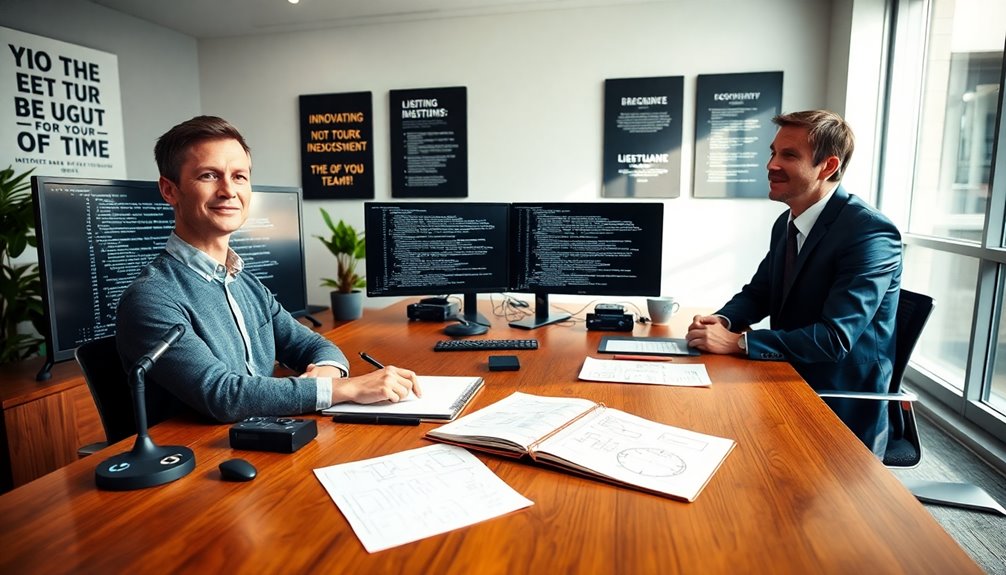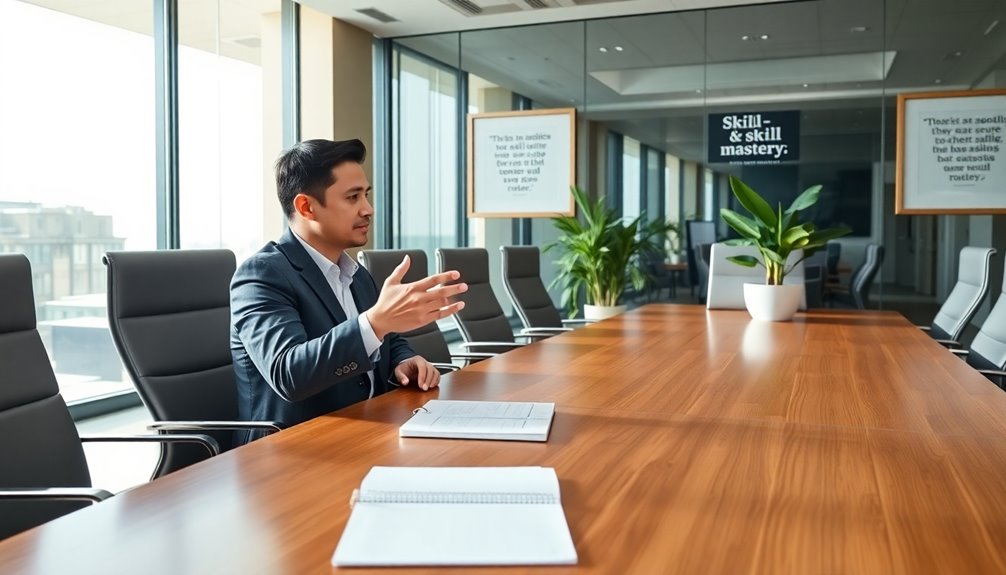You've got one hour to shine in your job interview, so let's maximize that time! Start by researching the company and job description—know their values and required skills. Prepare your behavioral answers using the STAR method, and craft clear, concise responses for open-ended questions. Set up a distraction-free environment and practice mental techniques to boost your confidence. Dress appropriately to project professionalism, and focus on effective communication during the interview. Get ready to impress and leave a strong impression. Want to learn more strategies to elevate your prep even further? Keep going!
Key Takeaways
- Research the company and role thoroughly to understand their mission, values, and culture before the interview.
- Prepare and practice behavioral answers using the STAR method to effectively showcase relevant experiences.
- Engage in mental preparation techniques like deep breathing and visualization to boost confidence and reduce anxiety.
- Focus on effective communication by actively listening, articulating responses clearly, and maintaining good body language during the interview.
- Follow up with a personalized thank you note post-interview to demonstrate appreciation and maintain professional connections.
Research the Company
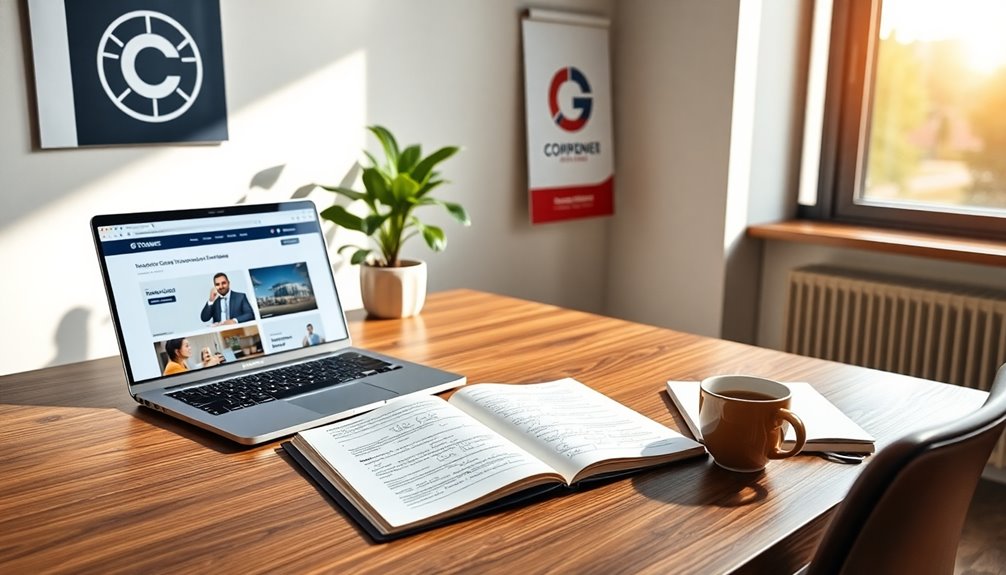
To ace your job interview, diving deep into researching the company is essential. Start by exploring the company's website. Look for their mission, values, and any recent achievements that showcase their success. Then, check their social media accounts to get a feel for the company culture and how they engage with employees and customers.
Next, investigate the company's history. Understanding significant events, acquisitions, and growth changes can provide context for their current operations. Familiarize yourself with the executive officers; knowing who leads the company can give you an edge in discussions.
Don't overlook the company's products and services. Identify what they offer, who their target customers are, and what sets them apart from competitors. This knowledge shows your genuine interest in their business. Additionally, aligning your skills and experiences with the job requirements can enhance your responses in the interview.
Finally, read employee reviews on sites like Glassdoor to gauge the work environment. Assess their workplace culture and values through their online presence. Taking the time to do this research not only prepares you for the interview but also helps you determine if the company aligns with your career goals.
Review the Job Description
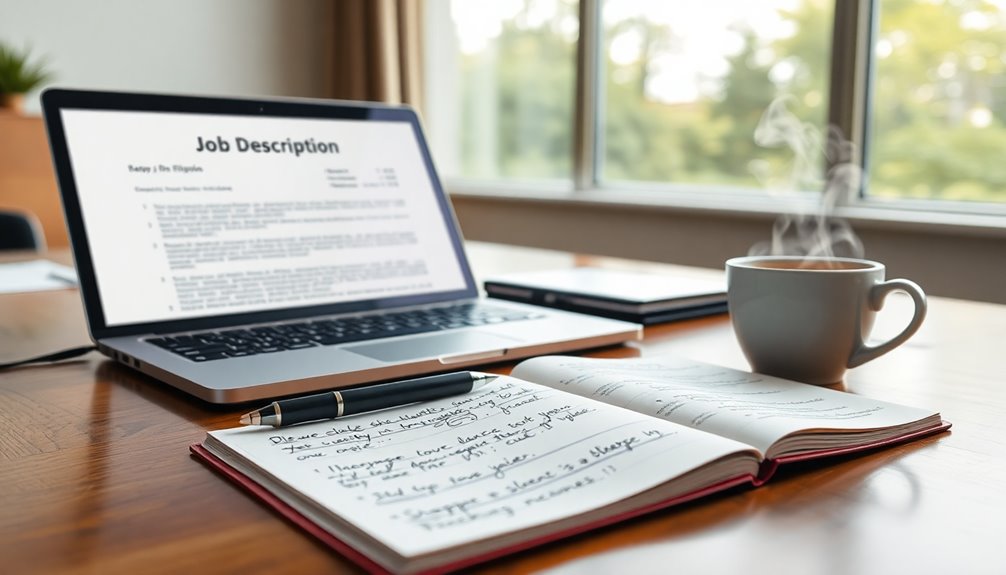
Reviewing the job description is crucial for tailoring your interview preparation effectively. This document not only outlines what the company is looking for but also highlights how you can position yourself as the ideal candidate. Start by focusing on key elements.
- Align with Qualifications: Identify the skills and qualities they seek, and match them with your qualifications. Make certain you understand the required background and education.
- Generate Mock Interview Questions: Transform job description points into potential questions. Craft queries based on the necessary skills and practice your answers.
- Clarify Ambiguities and Gaps: If anything is unclear, jot down questions to ask during the interview. Showing curiosity about day-to-day activities demonstrates your interest.
- Prepare Relevant Examples and Stories: Develop anecdotes that showcase your skills. Use the job description as a checklist to make sure you cover all crucial points. Understanding the responsibilities outlined in the job description can help you anticipate targeted inquiries during the interview.
Prepare Behavioral Answers
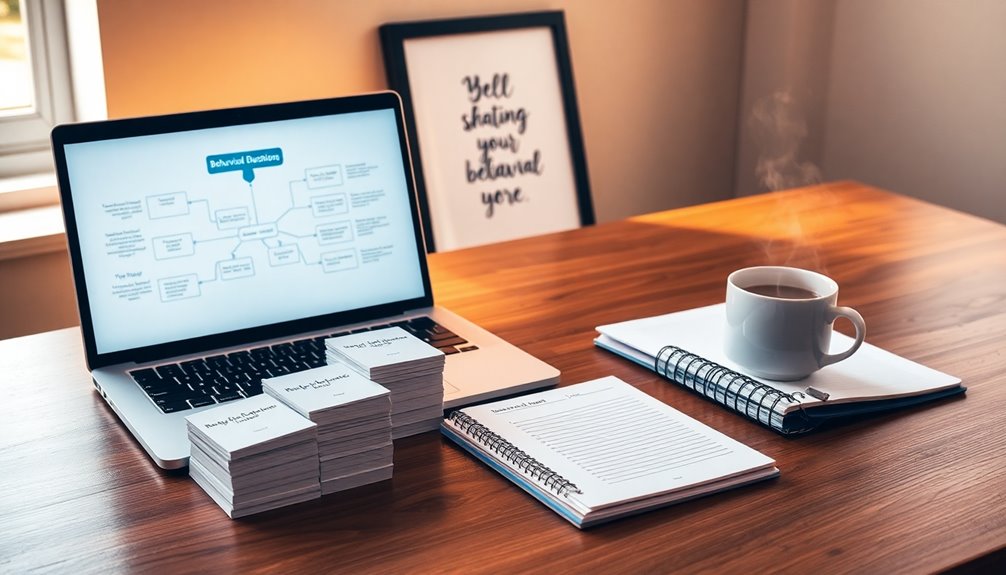
Preparing for behavioral interview questions is essential for demonstrating your experiences and suitability for the role. Use the STAR method to structure your answers: start with the Situation, detailing the context; then outline the Task, describing your specific responsibility. Next, articulate the Action you took to address the task, and finally, share the Result, highlighting the impact of your actions. Incorporating intelligent tutoring systems can provide insights into effective learning strategies that may benefit your preparation.
Identify relevant stories from your professional background. Reflect on major projects, performance reviews, and notable accomplishments that align with the job requirements. Consider challenging situations you've overcome and times when you developed new skills. Behavioral interviews focus on past behavior to predict future performance, making it crucial to frame your experiences effectively.
Prepare for common questions related to teamwork, problem-solving, leadership, conflict resolution, and goal achievement. Practice answering these questions aloud to boost your comfort and confidence. Keep your responses concise, ideally 1.5 to 2 minutes long.
Be honest and clear in your answers, making it easy for your interviewer to follow your narrative. Seek feedback from friends or mentors to refine your delivery. Ultimately, pause before responding to gather your thoughts, showcasing your confidence and thoughtfulness. This preparation will set you up for success in your interview.
Prepare Open-Ended Answers
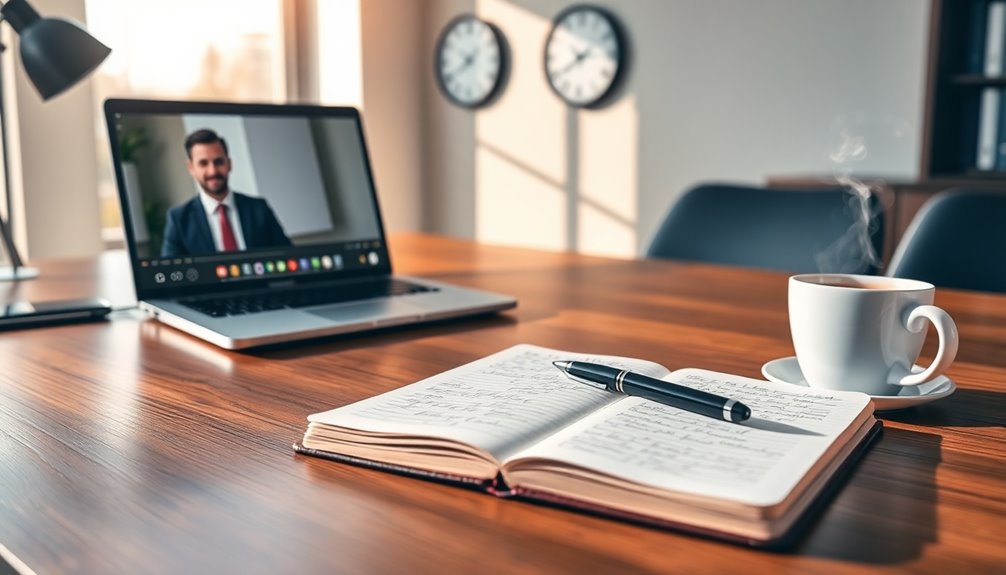
Open-ended answers are essential in interviews, as they allow you to showcase your experiences and thought processes in a more expansive way. When preparing these responses, focus on being specific, connecting to the job description, providing the right amount of detail, and making it personal. Here's how you can do that:
- Be Specific: Use concrete examples and specific numbers to back up your claims. Describe exactly what actions you took in previous roles and highlight your relevant skills.
- Connect to the Job Description: Use keywords from the job listing in your answers. Explain how your past experiences align with the job's requirements and showcase your achievements.
- Provide the Right Amount of Detail: Be thorough but concise. Share enough information to make your point without going off on tangents. Effective communication techniques are crucial in ensuring your responses resonate with interviewers.
- Make it Personal: Show your personality and values related to the role. Explain why the job and company resonate with you, emphasizing how your traits can enhance workplace culture.
Logistics and Setup
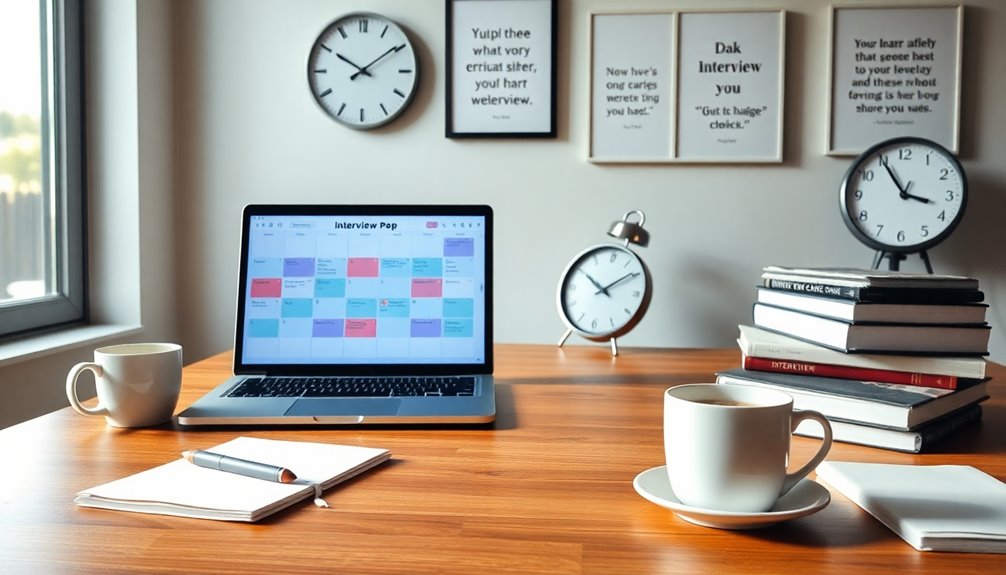
When diving into the logistics and setup for your interview preparation, it is vital to understand the intricacies of the logistics industry and the specific role you're applying for. Familiarize yourself with logistics' definition, which encompasses packaging, storage, shipment, and distribution networks. Recognize that transport is a significant aspect, involving the movement of goods.
Stay updated on industry trends by reading white papers, attending conferences, and following news alerts. Knowledge of recent developments and major supply chain trends will give you an edge. Familiarity with ISO standards indicates adherence to regulations and showcases your commitment to continuous improvement, which is crucial in logistics.
Make sure you're aware of the technical competencies required, such as experience with automated warehouse systems and transport management applications. Be ready to discuss concepts like ASN (Advance Shipping Notice) and LTL (Less Than Truckload).
Prepare examples from your background that illustrate your problem-solving skills and adaptability in managing complex operations. Highlight times you resolved inventory discrepancies or handled stress effectively.
Finally, think about your previous roles and the software you used, focusing on how you monitored stock levels, organized storage, and coordinated shipping. This preparation will help you present yourself as a strong candidate who understands the logistics landscape.
Mental Preparation
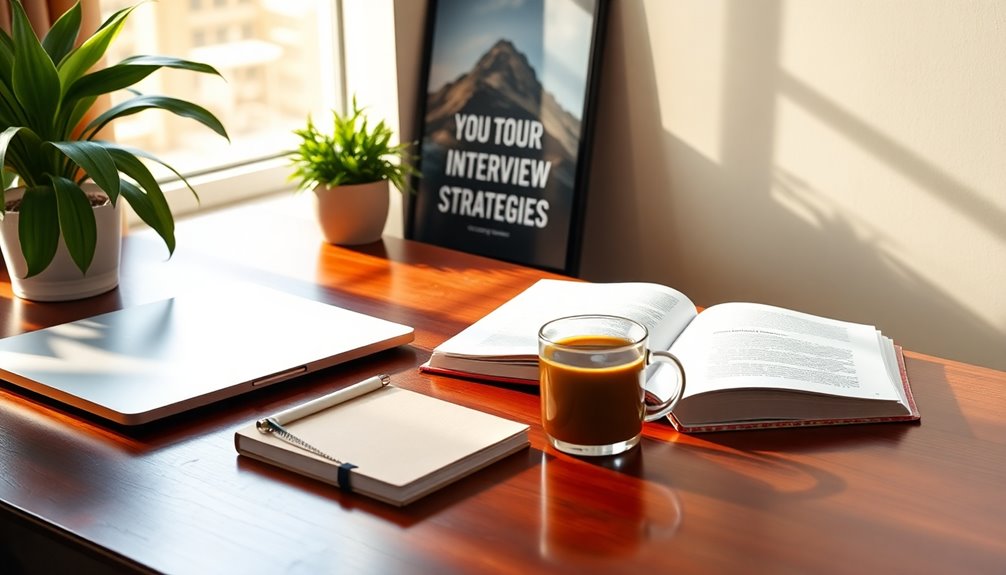
Your mental readiness plays an essential role in acing the job interview. To guarantee you walk in with confidence, implement these techniques:
- Deep Breathing Exercises: Use slow, controlled breathing to calm your mind and body. Inhale slowly, hold for five seconds, then exhale. Practice this before the interview to establish a steady breathing pattern. Performing deep breathing exercises can also help maintain focus and composure while speaking.
- Positive Affirmations: Repeat first-person statements like "I am qualified for this position" to boost your confidence. Tailor these affirmations to reflect the job and company, making them memorable and believable.
- Visualization: Picture the interview going smoothly. Imagine yourself confidently answering questions and receiving a job offer at the end. Envisioning success creates a positive mindset.
- Physical Relaxation: Prioritize comfort to enhance mental calmness. Take a hot bath, get quality sleep, and engage in light exercise to relieve stress. Techniques like meditation can help center your thoughts.
Frequently Asked Questions
What Should I Wear to the Interview?
For your interview, you should wear business formal attire to make a strong impression. Choose a single-breasted suit in navy or grey, paired with a crisp white dress shirt and a matching tie. Make sure your shoes are clean and polished. If the setting is more casual, opt for dark jeans or dress pants, a button-down shirt, and closed-toe shoes. Always aim for a polished and professional look to convey confidence.
How Early Should I Arrive at the Interview?
You should arrive 15 minutes early for your interview. This gives you time to check in with the receptionist and mentally prepare. Arriving too early, like 30 minutes, can create awkwardness. Make sure to plan your commute ahead of time, allowing for traffic and unexpected delays. If the hiring manager requests an earlier arrival, adjust accordingly. For virtual interviews, log in 5-10 minutes early to check your tech and settle in.
What Should I Bring to the Interview?
When heading to your interview, bring several copies of your resume and cover letter, along with a list of references. Don't forget business cards and any work samples if you're in a creative field. Pack a pen and notepad for notes, and prepare questions to ask the interviewer. For personal care, include breath mints, deodorant, and a water bottle to stay refreshed. Finally, consider a phone charger and a snack for energy.
How Can I Follow up After the Interview?
After your interview, you should follow up within a day with a thank-you note, expressing gratitude and reinforcing your interest. If the interviewer didn't specify a timeline, wait ten days before reaching out. In your follow-up, mention specific topics you discussed to jog their memory. Politely ask about the status of your application and offer any additional information that could help in their decision-making process. Keep it professional and concise.
What if I Don't Know the Answer to a Question?
When faced with a question that feels like a curveball, don't panic—think of it as a puzzle waiting to be solved. You can admit you're unsure, showing honesty and integrity. Take a moment to gather your thoughts, maybe even repeat the question to clarify. If you're still in the dark, ask follow-up questions or redirect to a related topic. Show your enthusiasm to learn; it'll leave a lasting impression.
Conclusion
As you step into your interview, picture yourself walking confidently through a bright doorway, leaving behind any self-doubt. You've researched, prepared, and practiced, transforming anxiety into excitement. Embrace the opportunity to showcase your skills and passion, letting your authentic self shine like a beacon. Remember, each question is a chance to connect and share your story. So take a deep breath, trust your preparation, and let your personality light up the room. You've got this!
